FoodWIse: Nutrition Education
Important Update
The congressional budget reconciliation bill signed into law on July 4, 2025 ends federal SNAP-Ed funding effective September 30, 2025.
For more than 30 years, UW–Madison Extension has provided local nutrition education across Wisconsin through the federal SNAP-Ed grant program. Working with schools, food pantries, farmers markets, and community centers, FoodWIse has taught practical, evidence-based skills in meal planning, food safety, and food resource management, helping people stretch food dollars and make healthier choices.
Extension is currently navigating the difficult process of winding down SNAP-Ed-funded programming. FoodWIse programming will continue through September 30, 2025, with staff winding down between October 1st and December 1st, 2025.
We know you may have questions. Below are answers to some of the most common ones.
Frequently Asked Questions
What is SNAP-Ed?
SNAP-Ed (Supplemental Nutrition Assistance Program-Education) complements SNAP, the nation’s largest anti-hunger program, by helping people eligible for FoodShare (SNAP in Wisconsin) make healthier food choices, be more active, and stretch their food dollars. Using proven, evidence-based approaches, SNAP-Ed increases knowledge around healthy living and expands opportunities to access healthy foods and physical activity. FoodWIse is one of six implementing agencies and grantees of SNAP-Ed in Wisconsin.
Has the SNAP-Ed program officially ended in Wisconsin?
Federal SNAP-Ed funding ends September 30, 2025. Limited programming will continue through December as staff transition out of their roles. Extension will not run SNAP-Ed-funded activities beyond that time.
Why is SNAP-Ed ending?
SNAP-Ed funding was eliminated by the federal FY2025 reconciliation law (Public Law 119-21).
What does this mean for FoodWIse?
FoodWIse has been funded primarily through SNAP-Ed (USDA Supplemental Nutrition Assistance Program Education) and EFNEP (the Expanded Food and Nutrition Education Program). Losing SNAP-Ed funding significantly reduces program capacity for delivering nutrition education, as SNAP-Ed accounts for approximately 90% of the overall FoodWIse budget. Extension will continue EFNEP programming in Dane, Kenosha, Milwaukee, Racine, Rock, and Waukesha counties, which have been identified as EFNEP priority areas in partnership with the National Institute of Agriculture (NIFA), and is exploring other funding options to sustain parts of this work. You can learn more about our EFNEP programming here.
What specific services/programs are going away?
Many SNAP-Ed-supported activities – classes and workshops in schools, senior centers, farmers markets, food pantries, and site-based community education – will be reduced or stopped when SNAP-Ed funding ends. Extension will keep curricula where possible, but with fewer staff and no SNAP-Ed funds for travel, materials, or site support. Local availability will vary by county.
Will Extension still offer nutrition education?
Yes. The Health & Well-Being Institute continues to prioritize nutrition education as part of our health and well-being program portfolio. We are exploring alternative funding sources and partnerships to maintain some nutrition education programming capacity, building on our existing infrastructure and expertise, and remaining EFNEP resources. We are currently restructuring the way this work is organized and delivered. EFNEP programming will continue in Dane, Kenosha, Milwaukee, Racine, Rock, and Waukesha counties. You can learn more about EFNEP here. The Health & Well-Being Institute will also continue to provide health education, including StrongBodies. You can explore the variety of Extension health and well-being programming here.
Can external organizations help Extension fill the gap?
Yes. We welcome opportunities to co-develop new community nutrition programs, apply for joint funding, or collaborate with local organizations to provide services. If interested, please contact Kathryn Boryc Smock, FoodWIse State Program Manager and Health & Well-Being Institute Associate Director, to start the conversation.
Is Extension leaving my county?
No. Extension remains committed to serving all Wisconsin communities. While SNAP-Ed programming is ending, Extension will continue to bring university resources to residents across the state. Some short-term coverage gaps may occur, but our broader mission to provide health and nutrition education to everyone in the state of Wisconsin continues.
Who can I talk to about concerns or next steps?
Partner organizations or media can reach out to Kathryn Boryc Smock, FoodWIse State Program Manager and Health & Well-Being Institute Associate Director.
FoodWIse has always been about more than just nutrition education. It’s about empowering communities to thrive. SNAP-Ed has helped make Wisconsin healthier, and we are proud of the work we’ve done and the lives we’ve impacted. Thank you for supporting our staff, our programs, and our mission.
FoodWIse is federally funded by the Supplemental Nutrition Assistance Program-Education (SNAP-Ed) and the Expanded Food and Nutrition Education Program (EFNEP) and serves Wisconsin residents with limited incomes.
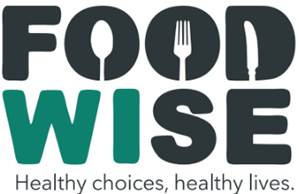
FoodWIse provides research-based education on:
*Empower families with limited financial resources to choose healthful diets and become more food secure by spending dollars wisely.
*Expose children to new fruits and vegetables and why they are important.
*Teach parents how to plan and prepare healthy meals.
*Support communities in making the healthy choice, the easy choice where people live, learn, work and play.
Education is available for all age groups and learning abilities as well as for those who speak Spanish only.
For more information on what FoodWIse is, please click the link below:
FoodWIse – Healthy Choices, Healthy Lives
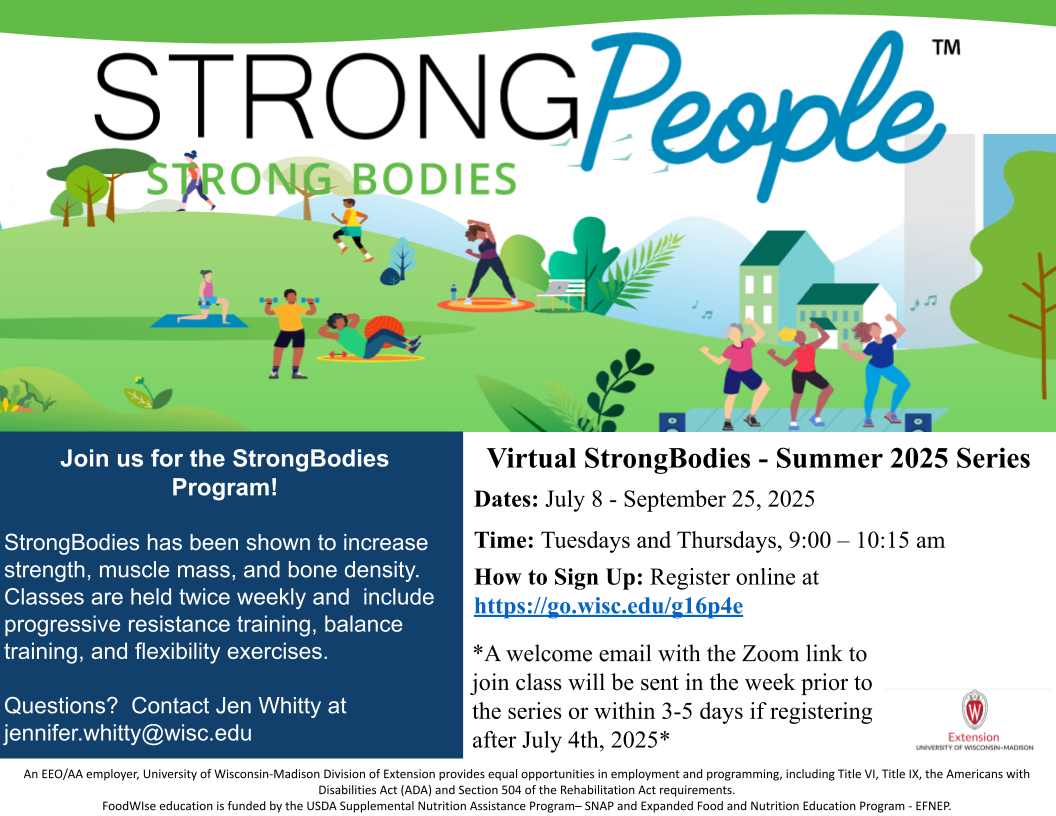
Kewaunee Public Library & Algoma Public Library
Contact: Kewaunee: Ann Reinke/Librarian 920-388-5015
Algoma: Katie Haasch/Adult Services Librarian 920-487-2295
Kewaunee County Libraries Become a “Libraries with Heart”
Two libraries in Kewaunee County recently became “Libraries with Heart” after receiving a Rural Health Grant from the American Heart Association (AHA). Algoma Public Library and Kewaunee Public Library in will be the sites.
Sue Koeppe is a HeartCorps member with American Heart Association, placed in Manitowoc with University of Wisconsin Division of Extension’s FoodWIse program. FoodWIse serves low-income, SNAP-eligible people, helping improve access to nutritious food and physical activity. So FoodWIse and HeartCorps are a natural fit. As part of her HeartCorps project, Sue received funding from AHA to purchase blood pressure monitors and other materials to create a Community Heart Hub blood pressure monitoring station within the library, as well as two check-out kits. Additionally, AHA provides training, technical assistance, and education materials to support the library’s efforts.
High blood pressure is one of the top risk factors for heart attack and stroke. Nearly half of American adults with high blood pressure are not aware they have this condition. Initiatives like Libraries with Heart are part of AHA’s efforts to increase access to blood pressure monitoring, particularly in rural communities which frequently face even higher rates of uncontrolled hypertension.
Ann Reinke, Librarian at Kewaunee Public Library said, “blood pressure kits are a much-needed service to the community and they will strengthen our ties in the community hub.”
Katie Haasch, Adult Services Librarian at Algoma Public Library has a personal reason for wanting the blood pressure kits at their location. “I was excited about getting involved with Libraries with Heart in my library because of my grandfather. Seven years ago, my paternal grandfather passed away from Congestive Heart Failure. Two years prior he had a stroke/heart attack while working in his yard. With being in a small community luckily emergency services were able to get to his house quickly and my grandmother was a retired nurse.”
Katie added, “Because of his health scare and his life after the stroke/heart attack, I often wondered what would have happened if they had lived out in the country? Didn’t have a phone nearby? Didn’t have family close by or if grandma hadn’t been a nurse? I wanted to give the Algoma Community to have a piece of mind of where they can access free blood pressure monitors and cuffs free of charge when they only need them for a short period of time.”
Check-out kits can be requested at the front desk and may be borrowed by an adult library card holder for up to two weeks.
Kewaunee County Public Health will offer events on-site at the public library as well. As Kewaunee County Health Officer Cindy Kinnard stated, “In Kewaunee County, heart disease is a leading health concern. The better educated our residents are, the more likely we will be to improve heart health here.” Once scheduled, the events will be announced on the library’s social media and web site.
Only a medical professional can diagnose high blood pressure, but free and easy access to blood pressure monitors can help community members track their blood pressure. In addition to the monitors, the library’s Community Heart Hub and check-out kits include instructions and basic information on understanding a blood pressure reading and when and how to contact a doctor. Kits include logs for tracking blood pressure and information about heart-healthy meals.
For more information on high blood pressure visit heart.org/HBP.
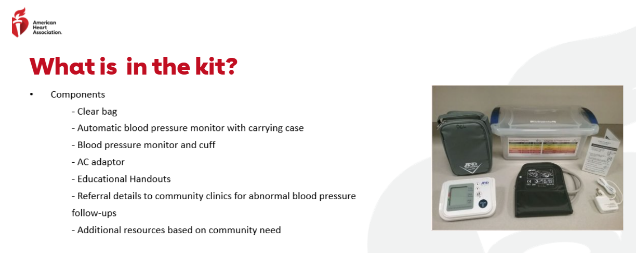
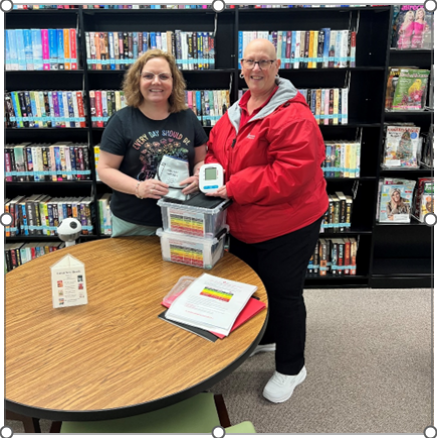
Librarian Carol Petrina (Left) from Kewaunee Public Library accepts two blood pressure monitoring kits from HeartCorps member Sue Koeppe. The Kits will be available for free checkout.
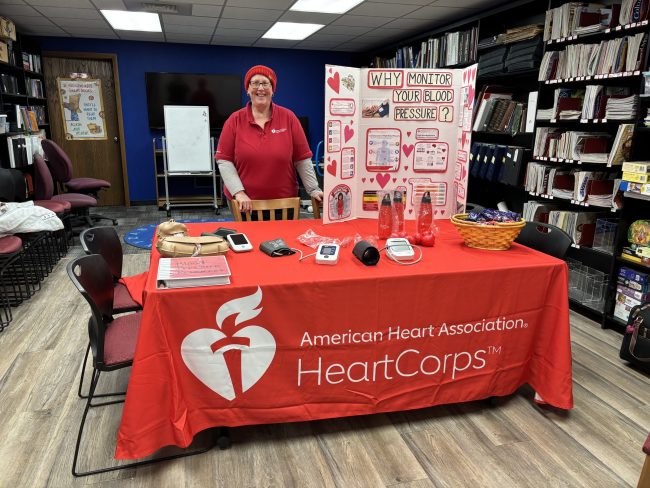
In honor of Heart Month, HeartCorps member Sue Koeppe offered free blood pressure checks in February at the Kewaunee Public Library.
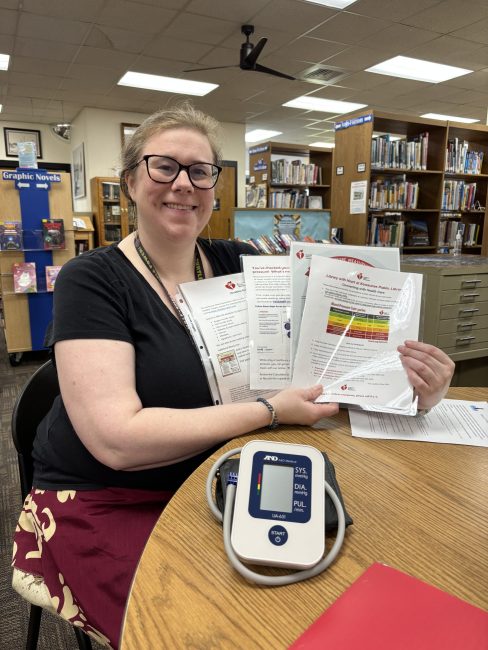
Adult Services Librarian Katie Haasch shares the contents of a blood pressure kit donated to the Algoma Public Library.
FoodWIse Mid-Year Impact Report
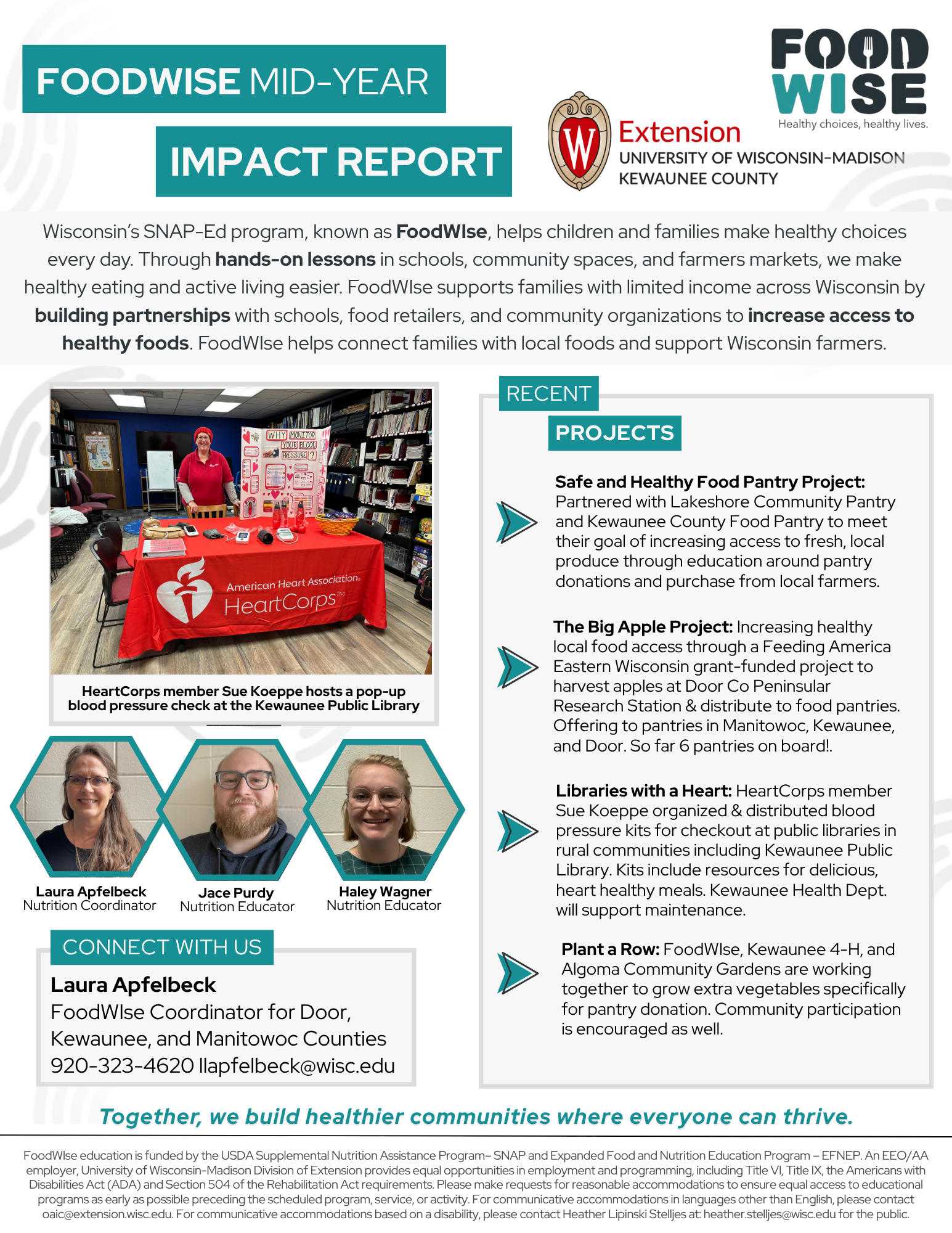
FoodWIse Impact Report
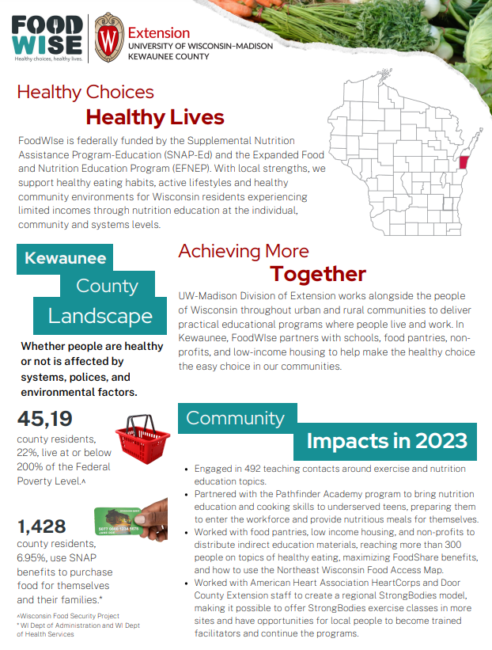
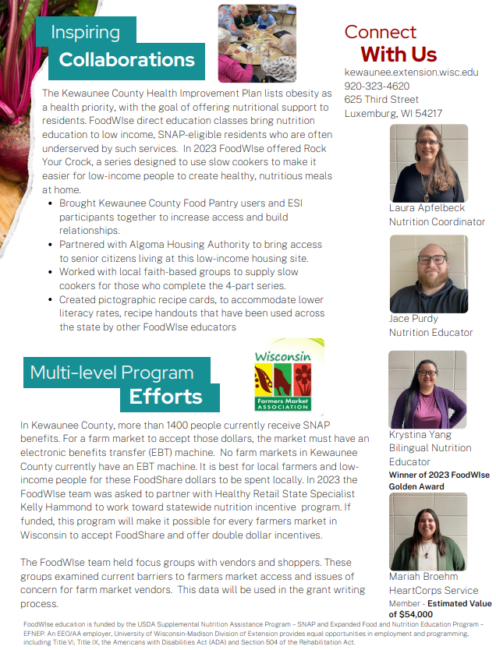
StrongBodies in Hmong Now Available
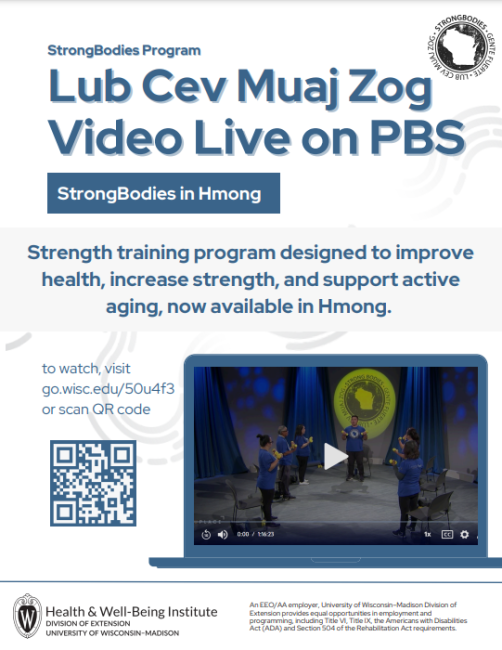
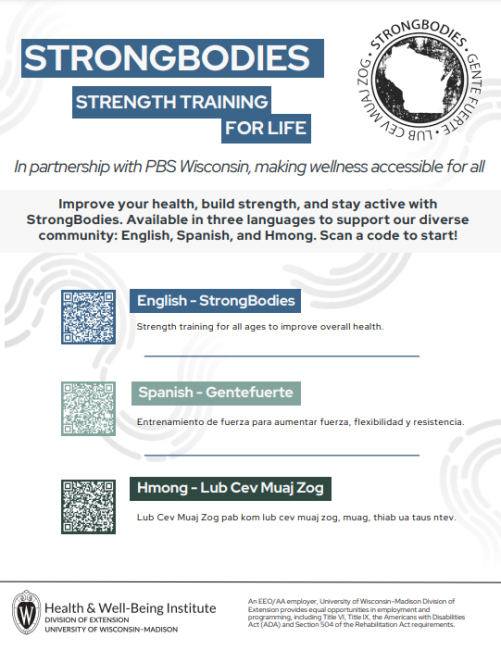
You can also access the recordings through the links below:
English recording: https://pbswisconsin.org/watch/university-place/strongbodies-strength-training-for-life-xhmva8/
Spanish recording: https://pbswisconsin.org/watch/university-place/gentefuerte-entrenamiento-de-fuerza-de-por-vida-jktmiw/
Hmoob recording: https://pbswisconsin.org/watch/university-place/lub-cev-muaj-zog-ua-kom-muaj-zog-mus-ib-sim-neej-wdzetw/
Extension Connection Articles
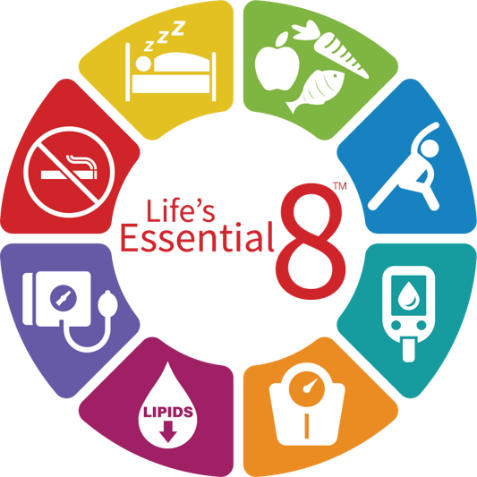
YOUR CHECKLIST FOR LIFELONG GOOD HEALTH
There are 8 important factors for cardiovascular health. These are split into 2 groups: health behaviors and health factors. Being aware of these and utilizing them in your own life will not just increase your heart health but increase your overall health and well-being. We’ll start first with a health behavior, IMPROVING SLEEP. Getting enough sleep has many benefits to your health. It can lower your risk of chronic diseases and Type 2 Diabetes, strengthen your immune system, improve your mood and increase your energy.
Facts on Fat – March 2024
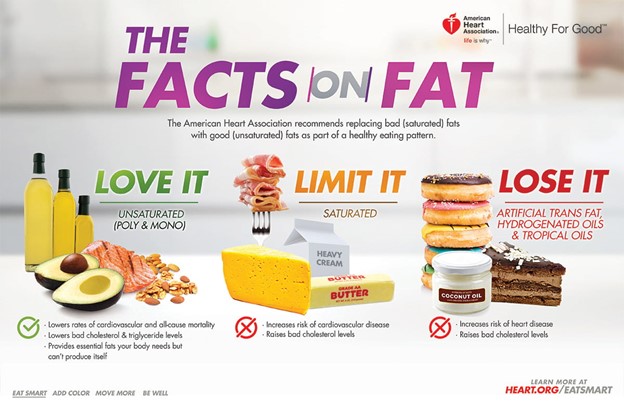
Rocking our Crocks at Grand View Terrace Kewaunee Oct 2023
Chicken, Rice, and Broccoli Bake
How FoodWIse is celebrating National Nutrition Month
Updated Farmers’ Market Rules and Guidelines
Quick Tips For Farmers Market Vendors 2023
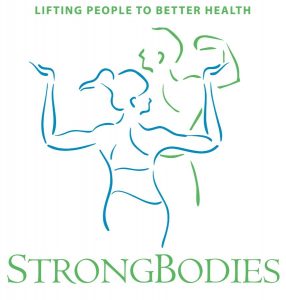
STRONG BODIES FOR ALL!
The FoodWIse team has been hard at work building strong muscles! FoodWIse nutrition educators Jace Purdy and Krystina Yang earned their Strong Bodies certifications on August 11. They are now able to lead this series of weight-bearing exercises for older adults.
Research shows that regular exercise provides many benefits to older adults. Yet only 7% of middle-aged and older people exercise daily.
Regular, weight-bearing exercise helps older adults increase their strength, muscle mass, and bone density, and decreases the risk of osteoporosis, diabetes, heart disease, arthritis, depression, and obesity. Exercise has also been shown to improve self-confidence, sleep, and vitality.
Preventing osteoporosis—porous bones that break easily and heal slowly—is especially important for middle-aged and older adults. About 1 of 3 women over age 40 suffers from this condition. Exercise can help prevent and treat osteoporosis. For many people, the challenge lies in finding ways for older adults to get the essential exercise they need.
So what’s the solution? The Strong Bodies exercise program!
Strong Bodies, an eight-week exercise program for older adults, teaches participants in small groups ways to exercise more regularly and eat more healthfully. This course is held twice a week at no cost to participants. FoodWIse aims to host these exercise classes in rural community settings where access to exercise facilities is limited.
To request classes in English, contact Laura Apfelbeck llapfelbeck@wisc.edu or 920-683-4170. Classes are available in Hmong, Spanish, and English.
Food Preservation Newsletters
July/August 2023 Food Preservation Newsletter
July/August 2022 Food Preservation Newsletter
March/April 2022 Food Preservation Newsletter
Jan/Feb 2022 Food Preservation Newsletter
Sept/Oct Food Preservation News 2021
FoodWIse Impact Statement
FoodWIse Impacts 2019 Kewaunee County
Food Sense Quarterly Newsletter (pdf)
Related Links of Interest:
Information on general nutrition and physical activity
Information on Food Safety:
Fact Sheets
Keeping Food Safe From Bacteria
Charts containing proper cooking temperatures (pdf)
STAFF
If you have any questions regarding FoodWIse in Kewaunee County, please contact:
Meet the Team
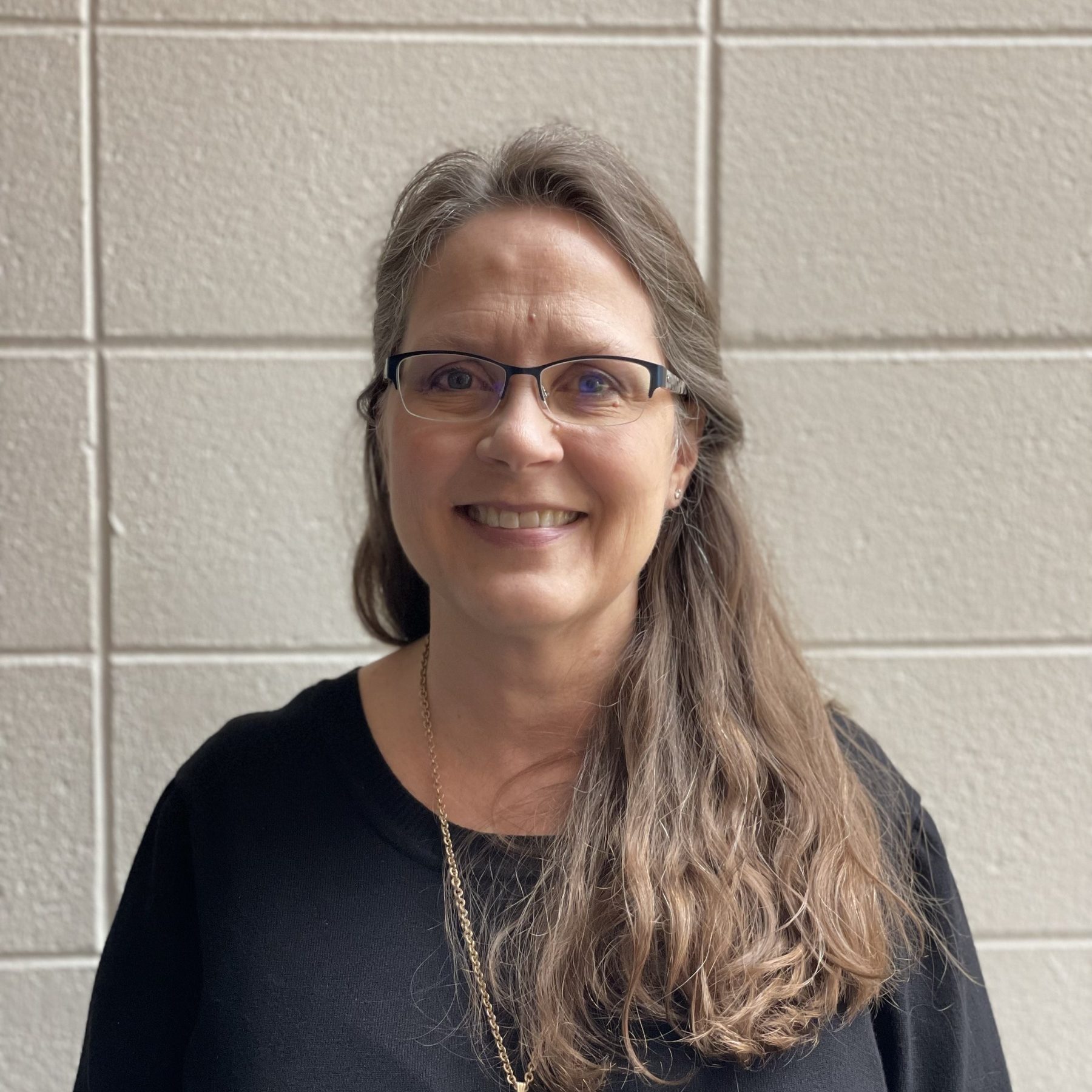
Laura Apfelbeck
FoodWIse Coordinator, Door, Kewaunee, Manitowoc Counties
920-683-4170
University of Wisconsin-Green Bay Manitowoc Campus
Hillside Hall
705 Viebahn St Manitowoc, WI 54220
Don’t Forget to Subscribe
In accordance with Federal civil rights law and U.S. Department of Agriculture (USDA) civil rights regulations and policies, the USDA, its Agencies, offices, and employees, and institutions participating in or administering USDA programs are prohibited from discriminating based on race, color, national origin, sex, religious creed, disability, age, political beliefs, or reprisal or retaliation for prior civil rights activity in any program or activity conducted or funded by USDA.
Persons with disabilities who require alternative means of communication for program information (e.g. Braille, large print, audiotape, American Sign Language, etc.), should contact the Agency (State or local) where they applied for benefits. Individuals who are deaf, hard of hearing or have speech disabilities may contact USDA through the Federal Relay Service at (800) 877-8339. Additionally, program information may be made available in languages other than English. To file a program complaint of discrimination, complete the USDA Program Discrimination Complaint Form, (AD-3027) found online at: http://www.ascr.usda.gov/complaint_filing_cust.html, and at any USDA office, or write a letter addressed to USDA and provide in the letter all of the information requested in the form.
To request a copy of the complaint form, call (866) 632-9992. Submit your completed form or letter to USDA by:
1. mail: U.S. Department of Agriculture Office of the Assistant Secretary for Civil Rights 1400
Independence Avenue, SW Washington, D.C. 20250-9410;
2. fax: (202) 690-7442; or
3. email: program.intake@usda.gov.
UW-Extension is an equal opportunity provider.
De conformidad con la Ley Federal de Derechos Civiles y los reglamentos y políticas de derechos civiles del Departamento de Agricultura de los EE. UU. (USDA, por sus siglas en inglés), se prohíbe que el USDA, sus agencias, oficinas, empleados e instituciones que participan o administran programas del USDA discriminen sobre la base de raza, color, nacionalidad, sexo, credo religioso, discapacidad, edad, creencias políticas, o en represalia o venganza por actividades previas de derechos civiles en algún programa o actividad realizados o financiados por el USDA.
Las personas con discapacidades que necesiten medios alternativos para la comunicación de la información del programa (por ejemplo, sistema Braille, letras grandes, cintas de audio, lenguaje de señas americano, etc.), deben ponerse en contacto con la agencia (estatal o local) en la que solicitaron los beneficios. Las personas sordas, con dificultades de audición o con discapacidades del habla pueden comunicarse con el USDA por medio del Federal Relay Service [Servicio Federal de Retransmisión] llamando al (800) 877-8339. Además, la información del programa se puede proporcionar en otros idiomas.
Para presentar una denuncia de discriminación, complete el Formulario de Denuncia de Discriminación del Programa del USDA, (AD-3027) que está disponible en línea en: http://www.ocio.usda.gov/sites/default/files/docs/2012/Spanish_Form_508_Compliant_6_8_12_0.pdf. y en cualquier oficina del USDA, o bien escriba una carta dirigida al USDA e incluya en la carta toda la información solicitada en el formulario. Para solicitar una copia del formulario de denuncia, llame al (866) 632-9992. Haga llegar su formulario lleno o carta al USDA por:
1. correo: U.S. Department of Agriculture Office of the Assistant Secretary for Civil Rights 1400
Independence Avenue, SW Washington, D.C. 20250-9410;
2. fax: (202) 690-7442; or
3. correo electrónico: program.intake@usda.gov.
UW-Extension es un proveedor que ofrece igualdad de oportunidades.




